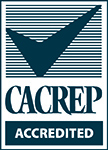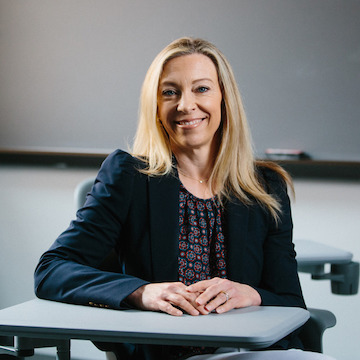Online Master's Degrees in Counseling
Change lives with a career as a professional counselor
Gwynedd Mercy University's accredited, 2.5 year distance-learning, 60-credit Master of Science degree in Counseling prepares students to assume professional roles in community mental health and primary and secondary schools.
The bulk of our program is completed online, allowing maximum flexibility while ensuring quality preparation. Counseling Skills (CNS 501) and Group Counseling (CNS 535/536) — which blend asynchronous coursework with some synchronous course meetings — and faculty-led group supervision throughout Practicum and Internship provide important opportunities to synthesize theory and practice.
For students who begin their degree in Fall 2024 or later, the program’s required three-day on-campus residency will take place during the 7-week course, CNS 537: Special Topics Residency. The on-campus residency gives students the chance to meet and learn from the program’s faculty, connect with their faculty mentor, strengthen relationships with fellow students, and stay current with new developments in the counseling field.
We find that this hybrid learning blend offers a nice balance between the convenience of distance education and the rewarding connections that come from contact with faculty and fellow students.
Students choose between two program concentrations: School Counseling and Clinical Mental Health Counseling.

GMercyU's Counseling programs are accredited by the Council for Accreditation of Counseling and Related Educational Programs (CACREP) through 2032.

The Core Curriculum
33 of your 60 credits are the core curriculum, which covers a broad base of professional skills relevant to every concentration practice area. In addition, this core provides a solid foundation for future doctoral-level education in the field.
| CNS 501 | Counseling Skills | 3 credits |
| CNS 504 | Human Development | 3 credits |
| CNS 505 | Foundations of Counseling | 3 credits |
| CNS 510 | Research Methods | 3 credits |
| CNS 513 | Practicum | 3 credits |
| CNS 520 | Theories in Counseling | 3 credits |
| CNS 521 | Assessment Techniques in Counseling | 3 credits |
| CNS 527 | Social Justice, Multicultural & Diversity Issues in Counseling | 3 credits |
| CNS 531 | Career Development | 3 credits |
| CNS 540 | Ethics and Legal Issues in Counseling | 3 credits |
| CNS 537 | Special Topics Residency | 3 credits |
For concentration curriculum, please visit the individual concentration pages for Clinical Mental Health Counseling or School Counseling.
Syllabi for enrolled or prospective students are available for review. Please contact our program director or our CACREP Liaison for any specific syllabus.
Mission Statement
In service of developing well-prepared, competent, and ethical counselors, the Counseling Program at Gwynedd Mercy is committed to providing a strong academic foundation augmented by top-notch clinical training. This holistic approach encourages students to synthesize their academic and experiential learning in service of helping persons experiencing mental health challenges while also working for positive change in the contexts in which they live, learn, and work. We are dedicated to preparing graduates who can not only successfully work as counselors, but who can transform lives through service and advocacy.
We believe that both self-awareness and respect for others are critical attributes for an effective, ethical counselor. Understanding one’s own social and cultural lens, exploring different points of view, learning to engage in meaningful conversation around difference, and promoting the mental wellness afforded by a more just society are all important facets of counselor education at GMercyU.
Faculty at Gwynedd are passionate about the field of counseling and believe in the importance of a strong professional identity. In today’s fast-paced, demanding world, we also recognize the value of community and are continually looking for ways to create connection with our students. Students, therefore, are assigned a mentor who will serve as a personal and professional resource throughout their program. Whether sharing advocacy opportunities, disseminating information about trainings and workshops, or serving as a sounding board, faculty mentors are dedicated to student well-being and professional development.
Why Choose GMercyU’s Counseling Program
Our counseling program is primarily delivered online via asynchronous coursework, which means you will work independently throughout the week, while enjoying the structure provided by regular due dates.
The program’s three-day on-campus residency provides an important opportunity for meaningful engagement with faculty and fellow students. It is offered in summer as part of the 7-week course, CNS 537: Special Topics Residency. Practicum and Internship classes, which require you to find a placement in a school or mental health setting, offer experiential learning and solidify your preparation for professional practice.
We recognize that students may need flexibility with regard to the pacing of their fieldwork. Fortunately, at GMercyU, students may elect to complete their fieldwork hours in either two semesters or three semesters, depending on the scheduling that works best for them and their fieldwork site.
Having access to a professional in your field of study is a valuable resource.
At GMercyU, from your first day as our student, you are assigned a faculty mentor who will see you through the program. Faculty mentors hold optional group mentoring meetings once per semester and are also available to discuss individual issues or concerns.
Students who graduate from our program have the foundational skills, knowledge, and training they need to be successful as new counselors. In fact, it is not uncommon for our students to be offered post-graduate positions with their fieldwork placements, which is a testament to their preparation for the counseling field.
- PLO1: Students will demonstrate knowledge of ethical standards of professional counseling organizations and credentialing bodies, and applications of ethical and legal considerations in professional counseling (3.A.10.)
- PLO2: Students will demonstrate knowledge of the impact of heritage, attitudes, beliefs, understandings, and acculturative experiences on an individual’s views of others (3.B.2)
- PLO3: Students will demonstrate knowledge of ethical and culturally relevant strategies for promoting resilience and optimum development and wellness across the lifespan (3.C.7,11)
- PLO4: Students will demonstrate knowledge of strategies for career development program planning, organization, implementation, administration, and evaluation (3.D.6)
- PLO5: Students will demonstrate knowledge of essential interviewing, counseling, and case conceptualization skills (3.E.3, 9.)
- PLO6: Students will demonstrate knowledge of approaches to group formation, including recruiting, screening, and selecting members (3.F.5)
- PLO7: Students will demonstrate knowledge of the use of assessments for diagnostic and intervention planning purposes (3.G.7)
- PLO8: Students will demonstrate knowledge of the analysis and use of data in research and counseling (3.H.6.)
- PLO9: Clinical Mental Health Students will demonstrate understanding of techniques and interventions for prevention and treatment of a broad range of mental health issues (5.C.5)
- PLO10: Students will demonstrate knowledge of the school counselor roles as leaders, advocates, and systems change agents in P-12 schools (5.H.6)
Find helpful resources below.
Creative Supervision Bibliography (PDF)
Internship Handbook (PDF)
Practicum Handbook (PDF)
State Licensure Notification
To become eligible for Licensed Professional Counselor (LPC) status in the state of Pennsylvania, you must successfully complete 60 semester hours of graduate coursework that meets the Council for the Accreditation of Counseling and Related Education Program (CACREP) curriculum requirements.
GMercyU's Counseling programs, including both the Clinical Mental Health and School Counseling concentrations, are accredited by the Council for Accreditation of Counseling and Related Educational Programs (CACREP) through 2032.
After graduation, you must pass the National Counselor Exam (NCE) and fulfill post-degree supervision requirements to earn the LPC credential in the State of Pennsylvania. Gwynedd Mercy University’s Master of Science in Counseling degrees meet state requirements across all concentrations of study.
*Important: Licensure laws and policies vary by state. Please look up the specific requirements for licensure in your state of residence, as well as states in which you may want to independently practice.
Meet Our Counseling Faculty and Staff

S. Meghan Walter, PhD
Associate Professor and Program Director
"Our counseling faculty are passionate about the field, and we approach our work with students with backgrounds of many years of professional clinical and school counseling experience. We firmly believe that now is an ideal time to pursue a career in counseling for several compelling reasons.... ."
Read her entire Welcome Letter here.
Meet the rest of our faculty and staff.
Frequently Asked Questions
Classes
Fieldwork courses are capped at 12 students per class and academic courses are capped at 18. However, it is not uncommon for academic courses to have 14 to 16 students in them.
While we don’t formally assign you to a cohort, you will find that students who begin the program at the same time often overlap in terms of course enrollment. This program model allows you to develop relationships with your fellow students without sacrificing the flexibility for which our program prides itself.
Clinical Training
Yes! Practicum and Internship experiences have hourly requirements that require flexibility while working full-time. These hourly requirements are designed to meet state and licensure standards. Our fieldwork coordinator will work with you in advance to make a plan.
Please note that for the school counseling track, Practicum and Internship will always happen during the school day and during the school year.
Yes, we have an expectation that students will locate their own fieldwork. This allows you to choose the setting of greatest interest to you, in the location that works for you, and with the schedule that aligns with your availability. However, our fieldwork coordinator plays a supportive role for students in giving them the tools they need to reach out to sites and is always available for questions or concerns.
This issue needs to be addressed on an individual basis by talking with the fieldwork coordinator and carefully considering the workplace’s ability to handle your changing role and needs as an emerging counselor. As a program that is endorsing graduates for entry into the counseling profession, we need to be sure that you are getting a full and rich clinical experience that allows you to practice the new counseling skills you are learning.
Some places of employment have those kinds of opportunities available and understand that the fieldwork experience must comply with a different set of standards than your day-to-day work. Other workplaces could struggle with maintaining good boundaries between your fieldwork role and your paid role and would therefore, not be a good fit.
Program Completion
Most students complete the program between 2.5 and 3.5 years, depending on how many semesters of Internship (2 or 3) they choose.
You will have completed coursework and fieldwork that are requirements for licensure in Pennsylvania. However, it is important to know that licensure as a counselor is governed by individual states and typically involves several years of post-graduation/pre-licensure experience and supervision. Therefore, no university or counseling program can guarantee that you can get your license immediately upon graduation.
Do familiarize yourself with the licensure requirements for the state in which you reside and/or in which you hope to seek licensure, as some policies can vary from state to state.
Admissions
Our approach to admissions is personal, nuanced, and holistic. There are many different types of people who could be successful counselors, therefore, we make an effort to get to know more about what makes you you. Along with getting a sense of who you are from your interview and personal statement, we consider transcripts and references from two individuals who know you and your academic and/or professional work.
Complete this form, then an admissions counselor will contact you to answer any questions and help as you assemble all the components of your admissions file.
Once your file is ready and submitted, our program will reach out with a date and time for a group interview. These interviews are typically held on Wednesday evenings at 5:00 pm EST once per month throughout the school year. Admissions decisions are typically communicated to applicants within two weeks of interviewing.
We will consider you for admission to our counseling programs based on your academic ability, expression of interests and goals, life experience, and personal interview.
To apply, you must:
- Hold a baccalaureate degree from an accredited institution of higher education;
- Demonstrate completion of the following undergraduate prerequisites:
- 3 credits in General Psychology, Developmental Psychology, Theory or another foundational course
- 3 credits in Research Methods or Statistics;
- Submit official transcripts from all academic institutions attended;
- Demonstrate achievement of a minimum grade point average (GPA) of a 3.0 on a 4.0 scale (see below if your GPA was lower than 3.0 and you do not currently hold a graduate degree);
- Complete of the Gwynedd Mercy University Graduate Application;
- Submit two letters of recommendation from:
- An academic who can attest to the applicant’s academic ability (preferred), and
- A professional or supervisor who can attest to the applicant’s professional qualification, abilities, and temperament for the field.
- Provide a 500 word (two pages, double spaced) personal statement in which you address the following three prompts:
- Discuss your career goals and how you believe GMercyU’s graduate counseling program and the specific concentration you are choosing will prepare you for your future path.
- Discuss what you believe it will take to be successful academically in an online graduate counseling program and why you believe you have the characteristics and ability to meet the challenge.
- GMercyU's core values include integrity in word and deed, respect for the dignity of each person, service to society, and social justice in a diverse world. How do these values relate to the profession of counseling?
- Attend a group nterview with program faculty.
NOTE: If your GPA was lower than 3.0, you must provide proof of acceptable scores on the Graduate Record Examination (GRE). We require a combined score of 292 or higher, and you must also complete the analytical writing test.
The GRE requirement is waived for applicants who currently hold a graduate degree or applicants who achieved a GPA of 3.0 or higher.
You may transfer up to six (6) credits of graduate work completed at an accredited institution for comparable courses in the GMercyU program, provided you earned at least a B in each course. Transfer credit decisions are made on an individual basis.
Grant Opportunity
Dear School Counseling Practicum and Internship Students,
Are you a current resident of Pennsylvania and placed for your internship in a PA school district, intermediate unit, area career and technical school, charter school, regional charter school, or cyber charter school? Would you agree to work at a Local Education Agency (LEA) in Pennsylvania as a school counselor for a minimum of three years following the completion of your master’s program in school counseling?
If so, we want to make you aware of a grant program that we recently learned about called PA HELPS. This grant provides the opportunity for internship students to be compensated for the school counseling internship with the stipulation of agreeing to work at an LEA in PA for three years.
To be considered for the grant, your HR or District office of your LEA where you are placed for your internship must complete and execute a PA HELPS LEA Application and Agreement and provide PHEAA with a copy of the agreement establishing the internship between the LEA and the school you are attending for your Educational Specialist Preparation Program (Gwynedd Mercy University, in your case).
Here is the grant website so you can read about eligibility and benefits.
We would like to emphasize that the application window will remain open until August 31, 2024 or until funds are exhausted. Awarding is a first-come, first- served basis upon receipt of the application. If you are interested in participating, please ask your site supervisor for help in identifying the appropriate person(s) in your District to complete and submit the application on your behalf. The website has a link to the application.
We at the University have no role in the grant program or application process and have no additional information other than what is on the website. All questions related to the grant program must be addressed to the email located on the program website. We are unfortunately unable to answer any questions you may have: pahelps@pheaa.org
Possible Career Paths
Those with a master's degree in counseling services can pursue these fulfilling careers and more:
- Rehabilitation Counselor
- Clinical Therapist
- Mental Health Counselor
- Chemical Dependency Counselor
- School and Career Counselor
- Marriage and Family Counselor
Post-Graduate Certificates
The Post Graduate Certification in School Counseling program creates a pathway for individuals with a master’s degree (from an accredited higher education institution) to meet the curriculum requirements for certification in PreK-12 School Counseling in PA.